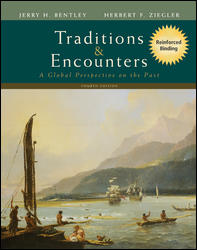Traditions and Encounters, 4th Edition (Bentley)Chapter 29:
REVOLUTIONS AND NATIONAL STATES IN THE ATLANTIC WORLDOverviewThe years 1776 and 1789 are pivotal dates in world history. The impact of the American Revolution and the French Revolution extended far beyond the borders of those two countries. Other revolts followed, and in spite of a conservative reaction in Europe, the world was not the same afterward. Some common elements of the revolutionary era: - New ideals. The ideals of freedom, equality, and popular sovereignty first expressed by the philosophes of the Enlightenment (see Chapter 24) were now enacted. John Locke's theory of government as a contract between rulers and subjects inspired the leaders of the American Revolution. Likewise, Jean-Jacques Rousseau's concept of a "social contract" based on the "general will" found expression in the National Assembly of France.
- New governments. Vastly different governments emerged in the United States, France, and Latin America. However, most revolutionary governments began with written constitutions, statements of individual rights, and elected assemblies. Political power was generally the privilege of men of property. Only Haiti empowered all men regardless of race.
- New ideologies. Political theories emerged to address the dramatic changes of the age. Conservatism, liberalism, and later, socialism (see chapter 30) differed in the understanding of change and authority and came to express the social and economic currents of the nineteenth century.
- Uneven social progress. Some changes, such as the abolition of feudal rights and obligations in France, were profound and permanent. Other changes, like the abolition of slavery in the Americas, came more slowly and piecemeal. Equal rights for women did not gain momentum until late in the nineteenth century.
- Nationalism. Popular sovereignty gave voice to a new form of identity. Based on notions of a common cultural and historic experience, nationalism was a powerful force in the nineteenth century. Ethnic minorities like the Greeks within the Ottoman Empire demanded national independence, and scattered cultural groups like the Italians and the Germans created new states to house their national identities.
 | 
















